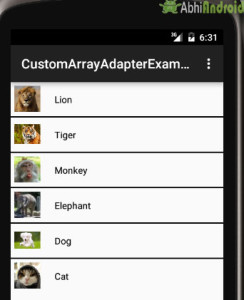

tOnItemClickListener(new AdapterView.OnItemClickListener() void onItemClick(AdapterView adapterView, View view, int pos, long id) In this case pos is the position of the clicked item in the ListView. We need to invoke the setOnItemClickListener() method of our ListView and pass into it an AdapterView.OnItemClickListener() annonymous class, and then override the onItemClick() method. Here’s how we will listen to itemClicks for our ListView, thus showing a simple toast message.


For instance it asks for these views as the user scrolls up or down.Įach of the views in the ListView is positioned immediately below the previous view in the list. So it will ask for the views on demand from a ListAdapter as needed. This is because as an adapterview the ListView does not know the details, such as type and contents, of the views it contains. Not only that but the adapter will also be responsible for converting each item result into a view that will be placed into the listview. This source can be an array or something more complex like database or from the network. The adapter becomes responsible for pulling data from a content source. This means that it requires an adapter for it to insert its items. ListView is an adapterview like gridview and spinner.
ANDROID STUDIO LISTVIEW ADAPTER EXAMPLE ANDROID
Step 10: Now create a Cursor in DatabaseHandler.java file.Android ListView simple examples based on working with collections and listening to various events.Ī ListView is an android widget that allows us to render a list of scrollable items. ListView mListView = (ListView) findViewById(R.id.list) Like: private DatabaseHandler db ĭb =DatabaseHandler.getmInstance(getApplicationContext()) And Also declare the object of ListView Widget. Step 9: Now goto your new EmpListActivity java class file and declare DatabaseHandler file into onCreate() Method. Step 8: Add TextView control in new Resource layout file.

Step 7: Give the name to this new Resource Layout File and click on OK Button. Step 6: Now add a new resource layout file which will content the items of ListView widget. Step 5: Now add ListView widget in activity_emp_list.xml file as below mentioned: Step 4: Now as per image there is a new java class file named EmpListActivity and a new Layout file named activity_emp_list.xml Step 3: Give the Name to Empty Activity (Like I give EmpListActivity) and click on Finish Button. Step 2: Select Empty Activity from given templates in gallery and click on Next Button. So Right click on Layout => New => Gallery
Firstly I create a new activity with the name of EmpListActivity.js ArrayAdapterStep 1: Going further with my previous tutorial. Before going further in this tutorial please take a look on my previous tutorial.
ANDROID STUDIO LISTVIEW ADAPTER EXAMPLE HOW TO
In my previous tutorial ( SQLite Database in Android App – Tutorial) I show you How to make a SQLite Database in Android App. In this tutorial I going to make a project using ListView view widget and CursorAdapter. The list items are automatically inserted to the list using an Adapter that pulls content from a source such as an array or database. Android ListView is a view which groups several items and display them in vertical scrollable list. The items come from the ListAdapter associated with this view. ListView WidgetĪ view that shows items in a vertically scrolling list is called ListView. The Cursor must include a column named “_id” otherwise this class will not work. The common adapters are ArrayAdapter, BaseAdapter, CursorAdapter, SimpleCursorAdapter, SpinnerAdapter and WrapperListAdapter.Īdapter that exposes data from a Cursor to ListView widget is called CursorAdapter. ListView or GridView) Android CursorAdapter and ListView Widget. Android provides several subclasses of Adapter that are useful for retrieving different kinds of data and building views for an AdapterView ( i.e.


 0 kommentar(er)
0 kommentar(er)
